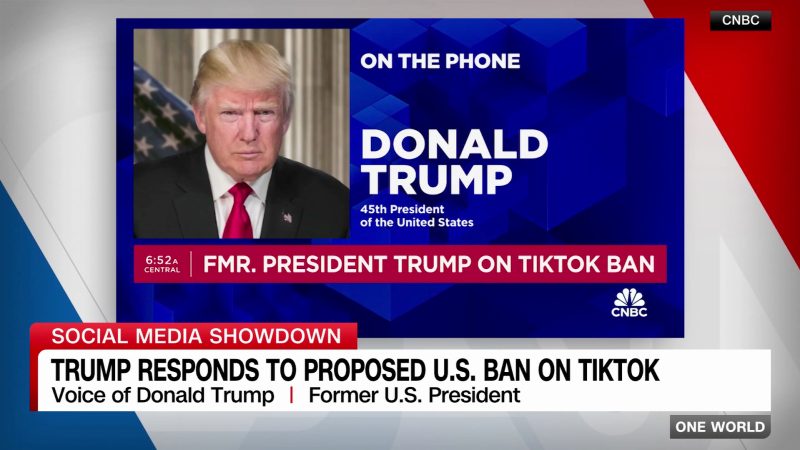Contents
Introduction:
President Trump supports TikTok, believing the platform played a vital role in connecting with younger voters during his campaign. He mentioned that TikTok brought billions of views to his campaign, significantly boosting his visibility among younger demographics. On December 27, 2024, President Trump filed a request with the U.S. Supreme Court to pause the enforcement of the forced sale order for TikTok, hoping that the court will allow him time to resolve the issue politically after he officially takes office on January 20, 2025. This also demonstrates that President Trump supports TikTok and has made efforts to ensure its continued operation in the U.S.
Trump’s Support for TikTok and Political Considerations
Trump is clearly aware of TikTok’s influence, especially in attracting younger voters. The platform has helped him reach a large audience, particularly young people, which proved crucial in his 2024 campaign. Therefore, it makes perfect sense for Trump to show support for TikTok. He even referred to TikTok as one of the “tools that helped him succeed.” Trump mentioned that TikTok brought a massive number of views to his campaign, significantly boosting his exposure and popularity among the younger demographic. This shows that his appreciation of the platform is not just commercially driven, but is more about connecting with voters and leveraging it for campaign publicity.
President Trump Supports TikTok Despite U.S. Department of Justice’s Concerns
The U.S. Department of Justice and other regulatory agencies have raised concerns about TikTok primarily related to national security. They argue that the Chinese-owned platform could send user data to the Chinese government or be used as a tool for espionage. While Trump supports TikTok, the Department of Justice is taking a more stringent stance, advocating for a ban or forced sale of TikTok to mitigate potential security risks. This reflects the ongoing tension in U.S.-China relations, where economic and social interests promote certain technological exchanges, while security concerns spur scrutiny of specific tech companies.
However, Trump’s request has faced opposition from the U.S. Department of Justice, which believes TikTok poses a national security risk, emphasizing concerns that the platform could be used for espionage or content manipulation. Currently, TikTok is seeking intervention from the U.S. Supreme Court to prevent the imminent ban, with oral arguments held on January 10, 2025. A ruling is expected soon.
Legal and Political Implications of Trump’s Request for a Pause
Trump’s request for the U.S. Supreme Court to pause the enforcement of the forced sale order indicates his desire to protect his political interests through legal means, preventing immediate fallout on TikTok and the young voter sentiment. Politically, this request also represents an attempt to maintain flexibility in policymaking after taking office, giving him time to explore a more appropriate resolution. While he faces strong opposition from the Department of Justice, this approach aligns with Trump’s political style—seeking to delay or overturn restrictive measures through legal procedures.
The Future of TikTok: Surge in U.S. Users Seeking Alternatives
For TikTok, continuing to operate in the U.S. would be a major victory, especially considering the regulatory challenges in other global markets. If Trump can manage to delay or halt the forced sale order after taking office, TikTok would likely benefit and maintain its dominant position in the U.S. market. However, this depends on whether the U.S. government’s stance on national security changes fundamentally. Even with Trump’s support, regulatory agencies like the Department of Justice may continue to monitor and impose restrictions on TikTok, leaving the platform’s future in the U.S. uncertain.
Meanwhile, Trump’s support for TikTok and his request to pause the forced sale order has sparked considerable attention. This has also led to another development: As January 19 approaches, many Americans, eager to find an alternative to TikTok, have begun downloading other social platforms, particularly Xiaohongshu (Little Red Book). On January 13, 2025, this sudden surge in popularity pushed Xiaohongshu to the top of the U.S. app download rankings, illustrating the intense and rapid competition in the social media space. TikTok’s future in the U.S. is now not only influenced by Trump’s political stance but is also heavily driven by consumer choices and market dynamics.
Conclusion:
Trump’s support for TikTok is driven by political considerations and the desire to appeal to young voters, but it faces the dual challenges of national security concerns and legal opposition. The Department of Justice’s concerns about TikTok’s security risks won’t disappear easily, and even if Trump’s request to pause the enforcement is granted, future decisions will likely continue to unfold in a complex interplay of legal and political forces. Such developments not only underscore Trump’s backing for TikTok but also highlight the evolving competition among social platforms in the U.S., with rising Chinese brands like Xiaohongshu making their mark.



